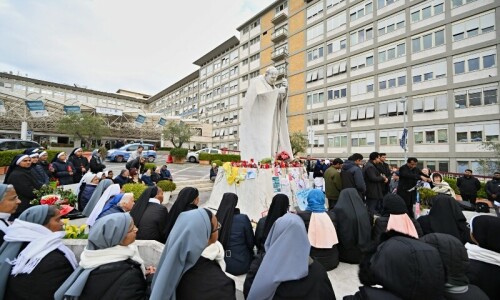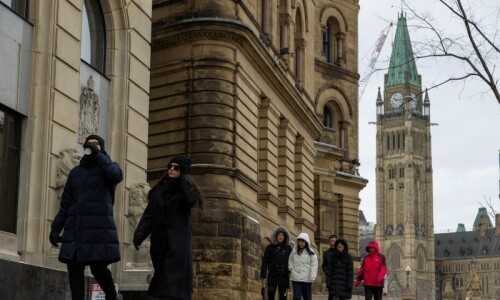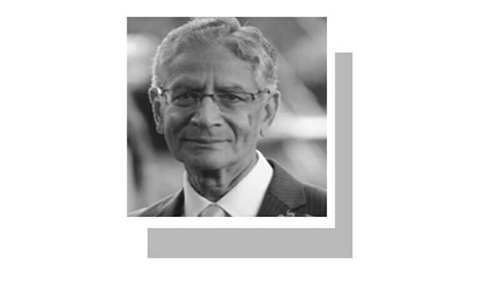World should incentivise Taliban instead of trying to control Afghanistan from outside: PM Imran on CNN

Prime Minister Imran Khan says there is a need to "incentivise" the Taliban's new administration in order to bring the current crisis to an end, instead of trying to control Afghanistan from the outside.
In an exclusive interview on CNN programme 'Connect the World' on Wednesday, host Becky Anderson asked Prime Minister Imran about apprehensions that the Taliban will not protect human rights, especially those of women and children.
"Where Afghanistan goes from here, I am afraid none of us can predict," the premier responded. "We can hope and pray that there is peace after 40 years. That the Taliban, what they have said, that they want an inclusive government, they want women rights — in their own context, they want human rights; they have given amnesty so, so far what they have said [shows] clearly they want international acceptability."
The prime minister said it was a "fallacy" that Afghanistan could be controlled from outside, saying history showed "no puppet government in Afghanistan is supported by the people."
"So rather than sitting here and thinking that we can control them, we should incentivise them because this current government in Afghanistan clearly feels that without international aid and help they will not be able to stop this crisis. We [...] should push them in the right direction."
Afghanistan at 'historic crossroads'
The premier said Afghanistan was currently at a "historic crossroads", and it could see peace after four decades if the Taliban worked towards an inclusive government.
"But if it goes wrong, and which is what we are really worried about, it could go to chaos, the biggest humanitarian crisis, a huge refugee problem, unstable Afghanistan and [...] the possibility of again terrorism from Afghanistan's soil," he added.
When pressed about concerns regarding women's rights, Imran said it was a "mistake" to think someone from outside would give Afghan women their rights.
"Afghan women are strong. Give them time, they will get their rights," he said. "You cannot impose women's rights from abroad."
'Pakistan suffered after siding with US'
To a question, Prime Minister Imran said he had not spoken to US President Joe Biden since the collapse of the Afghan government. When asked by Anderson to confirm that Biden hadn't called Imran since coming into office, the premier replied: "He is a busy man."
"Pakistan is a major non-Nato ally and yet no call between you and the US president. Do you see this as punishment for supporting the Taliban while they were killing US troops?" the host asked.
Prime Minister Imran said Biden should be asked "why he is too busy to call".
But he emphasised that Pakistan suffered greatly after siding with the US in the war in Afghanistan after 9/11, saying "at one point, there were 50 militant groups attacking our government."
In the 80s, he said, Pakistan joined the US against the Soviets and trained the Mujahideen to do jihad against foreign occupation in Afghanistan.
"Fast forward to 9/11, US needs us in Afghanistan. George Bush asked Pakistan to help and he famously said, 'We will not abandon Pakistan again.' Pakistan joined the US war in Afghanistan. [If I was] the prime minister, I would never have done that," he added.
He said after the US invasion of Afghanistan, the same mujahideen's acts were deemed "terrorism".
As a result, "they turned against us. Then Pashtun nationalism kicked in the entire tribal belt of Pashtuns on our side of the border," he added.
"So the jihadis turned against us, the Pashtuns turned against us, and the more we tried military operations in civilian areas, the more collateral damage [took place]."
On top of the militant groups' violence, the premier noted, there were 480 drone attacks by the US in Pakistan — "the only time a country has been attacked by its ally".
'Complete ignorance'
"It is complete ignorance," Prime Minister Imran said when asked about the reasons for the trust deficit between the West and Pakistan.
He said the Americans "did not understand what the Haqqani network was", which he described as a Pashtun tribe living in Afghanistan.
At the time of the Afghan jihad in the 1980s, he said, Pakistan was hosting five million Afghan refugees, which included some Haqqanis. "And the Haqqanis were Mujahideen who were fighting the Soviets. They were born in a Pakistani refugee camp.
"What they (Americans) were asking us was that we were supposed to check among three million Afghan refugees which ones were Taliban and which were not," he added.
Responding to allegations that Pakistan's intelligence was funding and supporting the Taliban through the Haqqani network, the premier said "the total budget of Pakistan is $50 billion for 220 million people. [...] Did we have the capacity to fund another war [when] we can barely meet our own expenses?"
He explained that "intelligence agencies' job is to speak to everyone and have connections to everyone".
"The question is: was Pakistan in a position to take military action against the Afghan Taliban when it was already being attacked from inside [by the] Pakistani Taliban?" he asked.
'Terrible' US relationship
Commenting on US-Pakistan ties, Prime Minister Imran said Islamabad's relationship with Washington during the US occupation of Afghanistan was a "terrible" one.
The US paid Pakistan some $20 billion in civilian and military aid and "we were like a hired gun," he added. But the Pakistani people suffered due to bomb blasts and the country lost $150 billion to the economy.
Prime Minister Imran said he would now like to see the US-Pakistan relationship to be "like the US has a relationship with India", and not a "one-dimensional relationship where they are paying us to fight. We want a normal relationship."
'Refugees biggest concern'
The premier termed refugees as the "biggest concern" emanating out of Afghanistan, saying Pakistan was already hosting three million and could not afford any more.
The second worry, he said, is terrorism. "We have three sets of terrorism. Terrorists in Afghanistan using the soil to attack us, ISIS, [and] Pakistani Taliban and the Baloch terrorists," he added.
The premier stressed that Pakistan was the country that would suffer the most if there was chaos in Afghanistan and stability was not achieved.

















































